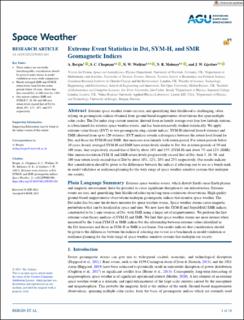| dc.description.abstract | Extreme space weather events are rare, and quantifying their likelihood is challenging, often relying on geomagnetic indices obtained from ground-based magnetometer observations that span multiple solar cycles. The Dst index ring-current monitor, derived from an hourly average over four low-latitude stations, is a benchmark for extreme space weather events, and has been extensively studied statistically. We apply extreme value theory (EVT) to two geomagnetic ring current indices: SYM-H (derived from 6 stations) and SMR (derived from up to 120 stations). EVT analysis reveals a divergence between the return level found for Dst, and those for SYM-H and SMR, that increases non-linearly with return period. For return periods below 10 years, hourly averaged SYM-H and SMR have return levels similar to Dst, but at return periods of 50 and 100 years, they respectively exceed that of Dst by about 10% and 15% (SYM-H) and about 7% and 12% (SMR). One minute resolution SYM-H and SMR return levels progressively exceed that of Dst; their 5, 10, 50, and 100 year return levels exceed that of Dst by about 10%, 12%, 20% and 25% respectively. Our results indicate that consideration should be given to the differences between the indices if selecting one to use as a bench mark in model validation or resilience planning for the wide range of space weather sensitive systems that underpin our society. | en_US |

